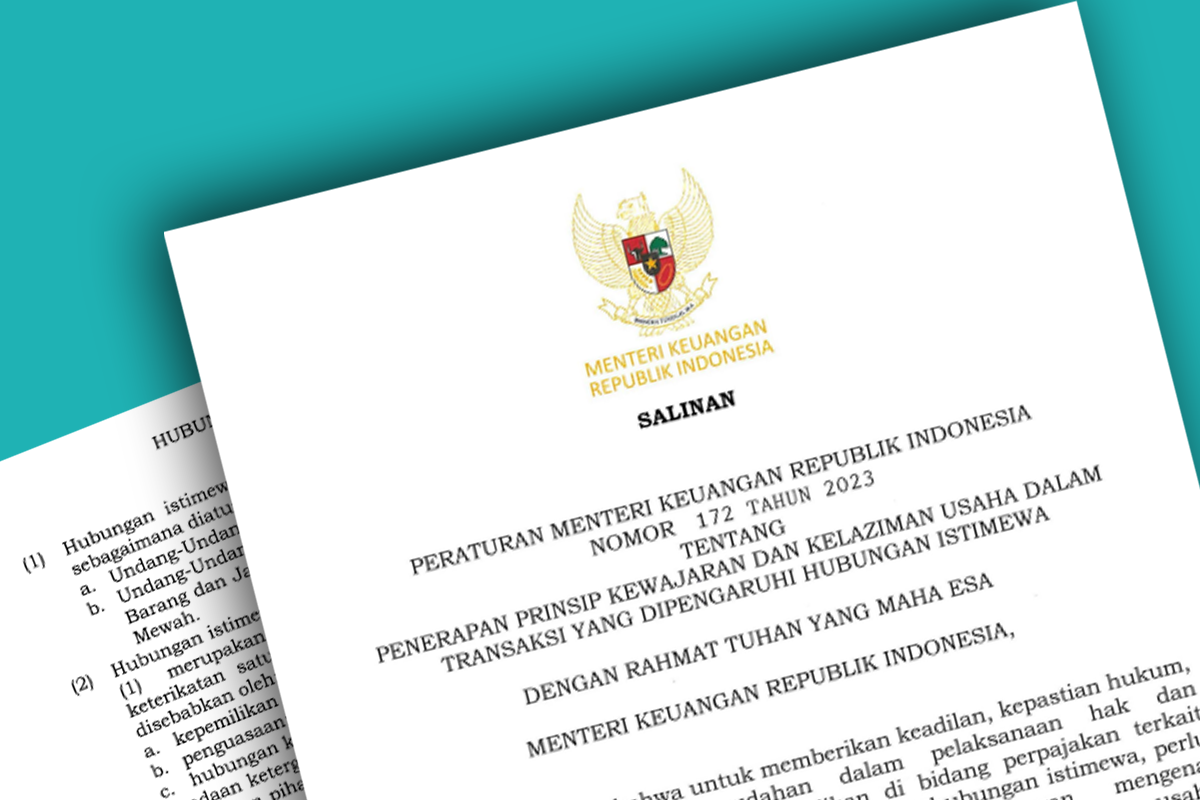PMK 172 Tahun 2023 Pertegas Ketentuan Ex-Ante dalam Peraturan Transfer Pricing

Lewat Peraturan Menteri Keuangan (PMK) Nomor 172 Tahun 2023, pemerintah Indonesia mempertegas penggunaan pendekatan Ex-Ante dalam penyusunan Dokumen Lokal (Local File) dan Dokumen Induk (Master File), sebagai bagian dari laporan dokumentasi harga transfer atau Transfer Pricing Documentation (TP Doc).
Dengan terbitnya beleid tentang Penerapan Prinsip Kewajaran dan Kelaziman Usaha dalam Transaksi yang Dipengaruhi Hubungan Istimewa ini, maka beberapa ketentuan lain sebelumnya, seperti PMK 213/PMK.03/2016, PMK 49/PMK.032019, dan PMK 22/PMK.03/2020, dicabut dan dinyatakan tidak berlaku.
Adapun dengan pendekatan Ex-Ante, maka penyusunan TP Doc harus berdasarkan data dan informasi yang tersedia saat transaksi dilakukan. Hal itu sebagai mana yang tertuang di dalam Pasal 17 ayat (1) PMK Nomor 172 Tahun 2023, yang berbunyi:
“Dokumen Penentuan Harga Transfer sebagaimana dimaksud dalam Pasal 16 ayat (2) huruf a dan huruf b, wajib diselenggarakan berdasarkan data dan informasi yang tersedia pada saat dilakukan Transaksi Afiliasi.”
Sebagai informasi, sebelumnya pendekatan Ex-Ante sudah diatur di dalam Pasal 3 ayat (1) PMK 213/PMK.03/2016 dan Pasal 9 ayat (1) huruf b PMK 22/PMK.03/2020 yang sudah dicabut melalui PMK 172 tahun 2023.
Konsekuensi Sanksi Administrasi
Konsekuensi yang terjadi apabila ketentuan Ex-Ante tidak dipenuhi sesuai PMK 172/2023, maka Wajib Pajak akan dikenakan sanksi sesuai dengan ketentuan peraturan perundang-undangan di bidang perpajakan sebagaimana yang diatur dalam Pasal 28 PMK 172/2023.
Dengan adanya konsekuensi tersebut, penting bagi Wajib Pajak untuk memastikan penggunaan pendekatan Ex-Ante atau price setting approach sebagai suatu ketentuan formal yang harus dipenuhi, dalam menganalisis transaksi afiliasi sesuai dengan prinsip kewajaran dan kelaziman usaha.
Pedoman Global
Sejatinya, pendekatan Ex-Ante yang dianut dalam regulasi Indonesia mengacu OECD Transfer Pricing Guidelines 2022 paragraf 5.27 yang berbunyi:
“Each taxpayer should endeavour to determine transfer prices for tax purposes in accordance with the arm’s length principle, based upon information reasonably available at the time of the transaction. Thus, a taxpayer ordinarily should give consideration to whether its transfer pricing is appropriate for tax purposes before the pricing is established and should confirm the arm’s length nature of its financial results at the time of filing its tax return”
Paragraf tersebut menunjukkan bahwa setiap Wajib Pajak harus berusaha menentukan harga transfer untuk tujuan perpajakan sesuai dengan prinsip kewajaran dan kelaziman usaha, berdasarkan informasi yang tersedia pada saat transaksi afiliasi terjadi.
Artinya, Wajib Pajak harus mempertimbangkan apakah penetapan harga transfer sudah sesuai untuk tujuan perpajakan sebelum transaksi afiliasi dilakukan.
Penggunaan data pembanding pada saat atau sebelum transaksi afiliasi dilakukan memang menimbulkan polemik. Paragraf 3.69 OECD TP Guidelines 2022 menyatakan secara jelas, bahwa terdapat isu dalam menentukan kesebandingan pada waktu transaksi terjadi, informasi atas faktor kesebandingan, transaksi pembanding yang digunakan dalam analisis kesebandingan.
Informasi yang berhubungan dengan kondisi transaksi independen dilakukan atau dilakukan selama periode waktu yang sama dengan transaksi afiliasi. Hal ini diharapkan menjadi informasi yang paling dapat diandalkan dalam analisis kesebandingan karena mencerminkan bagaimana pihak independen memiliki perilaku ekonomi yang sama dengan transaksi afiliasi.
Namun demikian, pada praktiknya Penulis melihat penerapan Ex-Ante tersebut seringkali masih menimbulkan perdebatan. Sehingga, diperlukan petunjuk peraturan yang lebih detail untuk menerapkan pendekatan Ex-Ante sehingga memberikan kepastian bagi Wajib Pajak.
*Penulis adalah Junior Associate Transfer Pricing MUC Consulting


